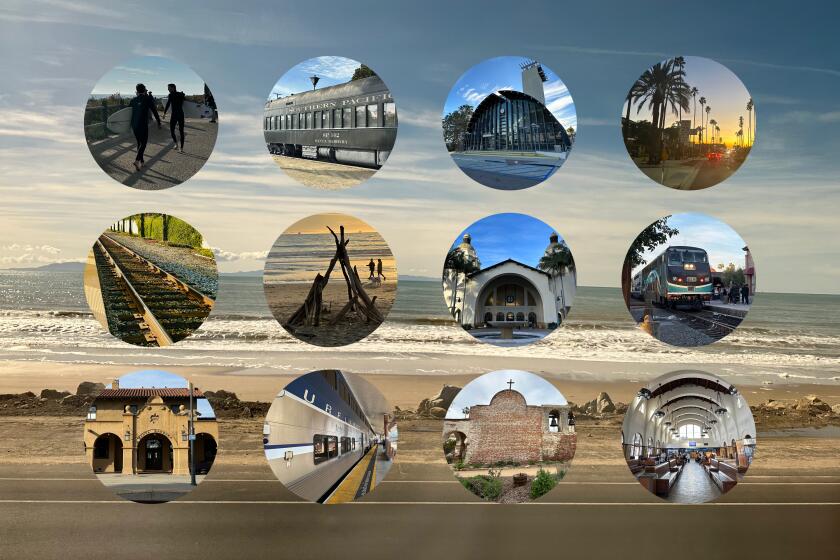Want the human touch? It’ll cost you, some airlines say
Contrary to conventional wisdom, talk is not cheap, especially if you want to talk to a live person at an airline these days.
In August, Northwest Airlines announced it would begin imposing a $5 per ticket fee for speaking to a customer service representative by phone and $10 to make a reservation face to face with an agent at an airport. American Airlines announced it was adopting the fees a week after Northwest; US Airways, United and Continental joined a few days later.
“Expect more airlines to follow suit,” said Henry Harteveldt, vice president of research in San Francisco for Forrester Research, a Cambridge, Mass.-based technology consulting firm.
Faced with record fuel costs and competition from low-fare carriers, airlines are cutting expenses wherever they can (reducing calls to the centers) and generating revenue (imposing fees for talking to someone). The new charges will accomplish both.
“We’re trying to be a profitable company and trying to turn over every stone,” said Tim Wagner, a spokesman for American Airlines. “Just last year we spent over $1 billion on distribution costs,” which include call centers, commissions and credit card expenses.
“This will offset about $25 million of that cost, and right now, for us, $25 million is within [the] margin of loss and profit.”
The fees apply to domestic and international travel and to frequent-flier award tickets. Travelers who have achieved the highest frequent-flier status and their travel companions are generally exempt. Flights booked at airport kiosks (when available) do not carry fees. The charges apply to new ticket purchases and are not applied if you’re calling to discuss an existing reservation.
Whether low-fare carriers have joined the human-contact surcharge fray is a matter of semantics. JetBlue and Independence Air offer discounts for booking tickets at their websites: $6 at JetBlue for a round-trip ticket, $10 at Independence Air, discounts that have helped drive consumers to the airlines’ websites. JetBlue books 75% of its tickets through its website; Northwest, by comparison, books 16%.
Southwest Airlines, which neither charges to speak to a person nor offers a discount for booking on its website, books about 57% of its total passenger revenue at its website.
It is not just discounts that account for the difference in consumer behavior when it comes to the Web. Some of the success low-fare carriers have had in getting travelers to use their sites corresponds with the site’s ease of use, said Gareth Edmondson-Jones, a JetBlue spokesman.
“At JetBlue, it’s about making it easy for the customer, and the proof is in the pudding,” said Edmondson-Jones, who called some competitors’ sites “convoluted.”
To be fair, the major airlines offer a more complex product, and they generally have more destinations than the low-fare airlines.
But getting people to book online also is about the times in which we live. Those have changed significantly, at least when it comes to the Web and consumer behavior. More people than ever have access to the Internet -- 67% of U.S. households have Internet access compared with 43% five years ago, Harteveldt said. Of people who take trips, 86% now have access to the Internet, he said.
As for the new fees, they’re similar to what you’ll pay on third-party online websites such as Orbitz and Expedia. EasyJet, a low-fare London-based airline serving Europe, offers a discount of 10 pounds, or about $18, for buying a round-trip ticket online versus calling one of its reservations agents.
And the $5 fee is a bargain compared with the $25 that’s commonly charged by brick-and-mortar travel agencies, according to the American Society of Travel Agents, a trade organization based in Alexandria, Va.
Using an agency online or in person may save you money in the long run because they allow you (or your travel agent) to shop multiple airlines for the best fare.
By contrast, calling an airline’s toll-free reservation number will give you access only to its airfares.
“In fairness, the $5 fee for the call center isn’t terribly much,” Harteveldt said -- especially compared with the price of an average leisure ticket. That’s about $290, said Bob Harrell, president of Harrell Associates, a New York firm that tracks airfares. Therefore, the $5 fee is less than 2% of the average ticket cost.
Raising call-center revenues and driving people to their own branded sites will not, however, instantly make the major airlines competitive with the low-fare carriers.
“They continually compare themselves to the low-fare carriers,” said Terry Trippler, an airfare expert with travel search engine SideStep.com.
“But the low-cost carriers also have very simple airfare structures.”
JetBlue and Independence Air also position their Web and call-center fees differently. Customers get a discount for using the Web, which is tantamount to charging a customer for using the toll-free reservation line, Trippler said. But it sounds better to the consumer to call it a “discount” on the Web.
And if you are expecting shorter times on hold when you call the airlines’ toll-free numbers or enhanced service now that you are paying to talk to a person, think again. No such changes are planned.
“We believe that our reservations sales agents have always provided professional and courteous service and will continue to do so,” said Kurt Ebenhoch, a Northwest Airlines spokesman.
Still, at least one consumer will be looking for some improvement.
“Now I don’t want anybody crabby when I call,” Trippler said. “I want nice people. For $5, I want some service.
“And for 10 bucks,” he added, “I’m not picking my bag up and putting it in the bag well.”
Contact James Gilden at www.theinternettraveler.com. Jane Engle, the regular Travel Insider columnist, is on vacation. Insider welcomes comments and questions. Write Travel Insider, L.A. Times, 202 W. 1st St., L.A., CA 90012, or e-mail travel@latimes.com.
Sign up for The Wild
We’ll help you find the best places to hike, bike and run, as well as the perfect silent spots for meditation and yoga.
You may occasionally receive promotional content from the Los Angeles Times.



